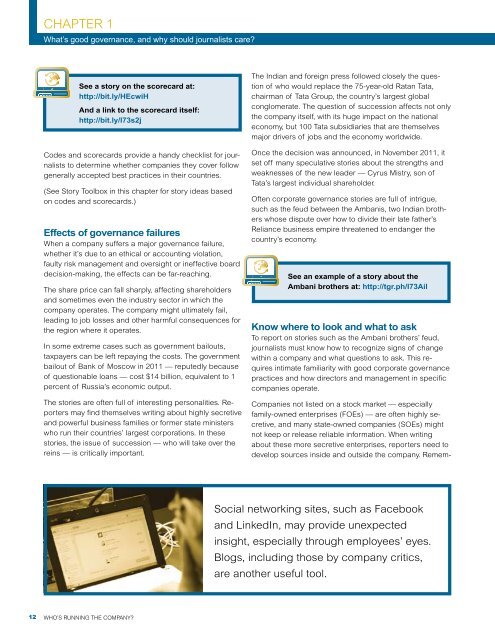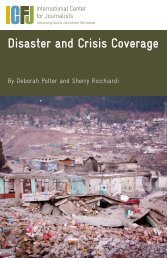Who's Running the Company? - International Center for Journalists
Who's Running the Company? - International Center for Journalists
Who's Running the Company? - International Center for Journalists
You also want an ePaper? Increase the reach of your titles
YUMPU automatically turns print PDFs into web optimized ePapers that Google loves.
CHAPTER 1<br />
What’s good governance, and why should journalists care?<br />
See a story on <strong>the</strong> scorecard at:<br />
http://bit.ly/HEcwiH<br />
And a link to <strong>the</strong> scorecard itself:<br />
http://bit.ly/I73s2j<br />
Codes and scorecards provide a handy checklist <strong>for</strong> journalists<br />
to determine whe<strong>the</strong>r companies <strong>the</strong>y cover follow<br />
generally accepted best practices in <strong>the</strong>ir countries.<br />
(See Story Toolbox in this chapter <strong>for</strong> story ideas based<br />
on codes and scorecards.)<br />
Effects of governance failures<br />
When a company suffers a major governance failure,<br />
whe<strong>the</strong>r it’s due to an ethical or accounting violation,<br />
faulty risk management and oversight or ineffective board<br />
decision-making, <strong>the</strong> effects can be far-reaching.<br />
The share price can fall sharply, affecting shareholders<br />
and sometimes even <strong>the</strong> industry sector in which <strong>the</strong><br />
company operates. The company might ultimately fail,<br />
leading to job losses and o<strong>the</strong>r harmful consequences <strong>for</strong><br />
<strong>the</strong> region where it operates.<br />
In some extreme cases such as government bailouts,<br />
taxpayers can be left repaying <strong>the</strong> costs. The government<br />
bailout of Bank of Moscow in 2011 — reputedly because<br />
of questionable loans — cost $14 billion, equivalent to 1<br />
percent of Russia’s economic output.<br />
The stories are often full of interesting personalities. Reporters<br />
may find <strong>the</strong>mselves writing about highly secretive<br />
and powerful business families or <strong>for</strong>mer state ministers<br />
who run <strong>the</strong>ir countries’ largest corporations. In <strong>the</strong>se<br />
stories, <strong>the</strong> issue of succession — who will take over <strong>the</strong><br />
reins — is critically important.<br />
The Indian and <strong>for</strong>eign press followed closely <strong>the</strong> question<br />
of who would replace <strong>the</strong> 75-year-old Ratan Tata,<br />
chairman of Tata Group, <strong>the</strong> country’s largest global<br />
conglomerate. The question of succession affects not only<br />
<strong>the</strong> company itself, with its huge impact on <strong>the</strong> national<br />
economy, but 100 Tata subsidiaries that are <strong>the</strong>mselves<br />
major drivers of jobs and <strong>the</strong> economy worldwide.<br />
Once <strong>the</strong> decision was announced, in November 2011, it<br />
set off many speculative stories about <strong>the</strong> strengths and<br />
weaknesses of <strong>the</strong> new leader — Cyrus Mistry, son of<br />
Tata’s largest individual shareholder.<br />
Often corporate governance stories are full of intrigue,<br />
such as <strong>the</strong> feud between <strong>the</strong> Ambanis, two Indian bro<strong>the</strong>rs<br />
whose dispute over how to divide <strong>the</strong>ir late fa<strong>the</strong>r’s<br />
Reliance business empire threatened to endanger <strong>the</strong><br />
country’s economy.<br />
See an example of a story about <strong>the</strong><br />
Ambani bro<strong>the</strong>rs at: http://tgr.ph/I73Ail<br />
Know where to look and what to ask<br />
To report on stories such as <strong>the</strong> Ambani bro<strong>the</strong>rs’ feud,<br />
journalists must know how to recognize signs of change<br />
within a company and what questions to ask. This requires<br />
intimate familiarity with good corporate governance<br />
practices and how directors and management in specific<br />
companies operate.<br />
Companies not listed on a stock market — especially<br />
family-owned enterprises (FOEs) — are often highly secretive,<br />
and many state-owned companies (SOEs) might<br />
not keep or release reliable in<strong>for</strong>mation. When writing<br />
about <strong>the</strong>se more secretive enterprises, reporters need to<br />
develop sources inside and outside <strong>the</strong> company. Remem-<br />
Social networking sites, such as Facebook<br />
and LinkedIn, may provide unexpected<br />
insight, especially through employees’ eyes.<br />
Blogs, including those by company critics,<br />
are ano<strong>the</strong>r useful tool.<br />
12<br />
WHO’S RUNNING THE COMPANY?
















